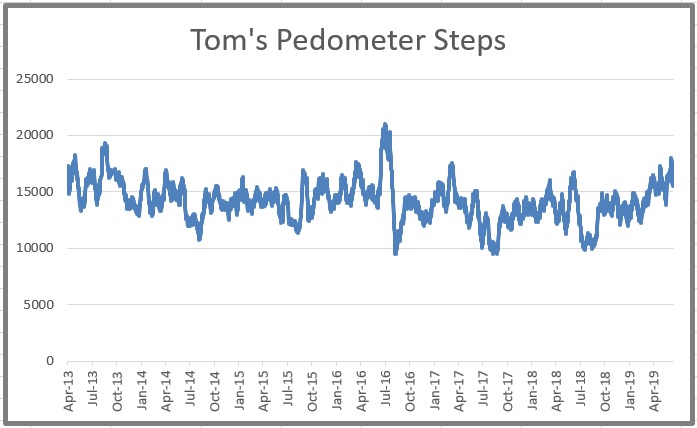
| Volume 36 #1 | July/August 2019 | |
 |
I was curious to chart my pedometer-steps data for the past six years to observe how much my activity has declined as I have aged. The data reports I am maintaining the same activity level. The six-year average is 14,100 steps per day. I am active for only 2.4 hours per day, and sedentary for 21.6 hours.
I attribute the healthy activity level to folk dancing three days a week amongst Scottish dancing, square dancing, international folk dancing. Effortless motivation to move to the music!
I usually have fewer steps during the summer while Scottish dancing and square dancing are on a break. The summer of 2016 had significantly more steps when Liza and I visited Scotland and Ireland for five weeks, including one week of intensive Scottish dancing at RSCDS summer school in St Andrews. The chart indicates that I needed some rest after we returned home! You might consider joining me and other Scottish dance friends to try out the international folk dance club, on Tuesday afternoons in the air-conditioned Marshall Center, 2:30-3:45p.m. We dance around twenty dances during the hour and repeat many dances each week, with many pedometer steps.
The readers of this publication may know that mid June this year, Eunice and I headed for the Canadian Maritimes and spent some time on Cape Breton Island. Here's a wee report of just a tiny slice of life during that time on the Island.
As last summer, we headed for The Red Shoe pub Friday evening to take in the music and culture of the area. This particular evening the pub was packed and we were seated at a four chair table but there was no one in the other chairs.
As the pressure was building for seats, the server asked to seat another couple with us and we replied, "Certainly!" After they were seated, we learned that Laurence and Gwen Cameron are the parents of one of the fiddlers that evening, Doug Cameron. His Laurence organized a Cape Breton style square set dance right there in the pub later on in the evening. We were soon invited to join them. Though I've forgotten the step dancing I learned in Linda Mae's class and Eunice was somewhat concerned, we did quite well as the dance figures are much like Irish Ceilidh dances, relatively simple and the skills learned in our SCD classes transferred quite readily. The local people there in the set were impressed and we heard from others at our B & B the next morning that had been at the pub that they were also impressed with our heretofore unknown abilities
Sometime after, we needed to leave so Eunice could rest and I made our apologies to whit, "Apologies that we're party poopers but Eunice has a medical condition that causes her to tire easily." They were very gracious and replied, "You're not party poopers at all as you stepped right in and participated. The dancing is good medicine anyway."
Let’s face it. Teachers are also human. They can have good days and bad days. They can be tired at the end of a long day. They can be distracted by events in their own lives. Sometimes they can even be bright and focused. Here are some ways that you can help your teachers.
Be quiet. While we always emphasize that SCD is social dancing, it is very distracting to the teacher to have dancers in the set chatting while they are trying to teach a dance. Even if you’re an experienced dancer and can ‘get’ the dance after watching it once, please listen attentively. The other dancers in your set will appreciate it almost as much as the teacher does.
If you’re sitting out with another person (dancer or not), please refrain from having a conversation while the teaching is happening. It is very distracting to have to talk over a sideline conversation. Please suspend your conversation until the music starts. You’ll have 5 to 10 minutes to talk during the dancing (although, that’s the most interesting time to watch).
Ask questions. Please direct your questions to the teacher. You may either put your hand up, or just get the teacher’s attention, but if you have a question please ask it of the teacher, and not the person next to you. If something wasn’t clear, it’s likely that it wasn’t clear to someone else in the room also.
If the person next to you asks you a question, unless it is a single syllable answer, please put your hand up or get the teacher’s attention and direct the question to the teacher.
If you remember a dance that is being taught, and the teacher has the figures in the wrong order, or says left hand when they mean right hand, or leaves out some bars, it is perfectly alright to correct the teacher out loud. Teachers are allowed to be human, but they definitely don’t want the dance to go awry.
Trust that the teacher has a Plan. The teachers all truly appreciate the many experienced dancers who come to the basic class. It’s wonderful to have dancers who know what they’re doing assist dancers who are learning. That being said, experienced dancers are not teachers. If the teacher has left out some ‘vital’ point in a figure or step, that does not affect the dancing of the dance, they probably meant to. Different people learn at different rates. Some people can absorb a lot of information in an evening, others cannot. Teachers walk a fine line. They attempt to give students as much information as they can handle without overwhelming them, while also being able to perform the dance.
Thank them. Teachers try to be generous with praise for their students – it makes the students try harder to be better students. It works the other way, too. Students who are generous with praise for their teachers will inspire the teachers to work harder to be better teachers. It’s a wonderful thing, at the end of a class, to have the dancers clap and thank you for teaching. Humans thrive on praise. Teachers are human.
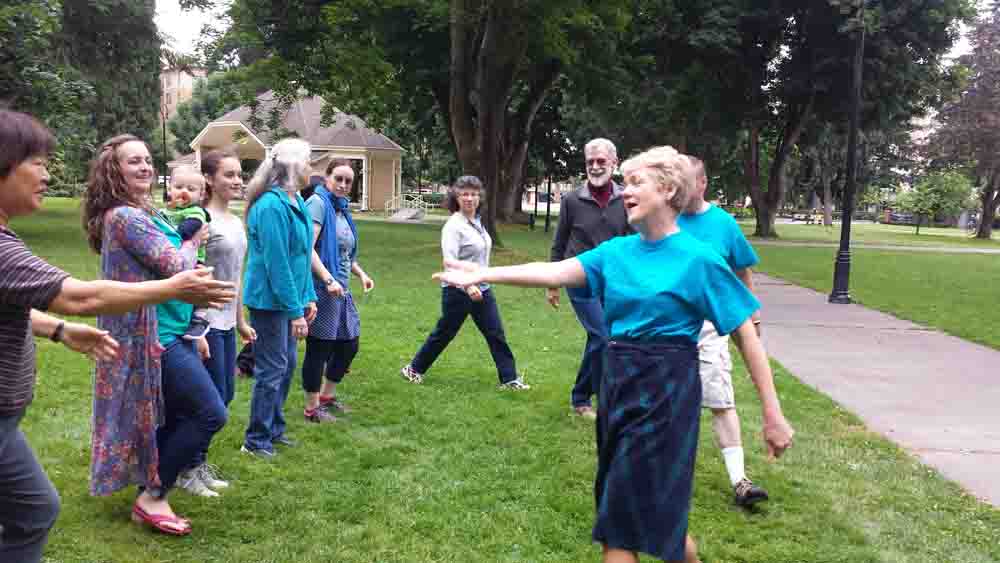 |
Scottish dancing is effectively a secret in the Vancouver and Portland area. The Branch plans to lead a one-hour summer dancing session during each month in June, July, and August, in Esther Short park during Farmers Market where people will see us, in order to raise awareness for Scottish dancing in the community.
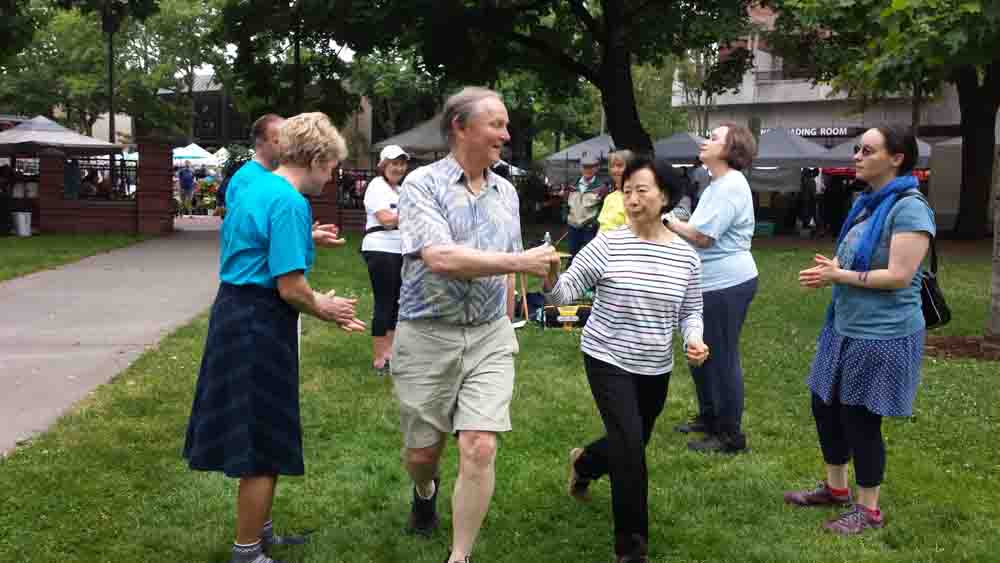 |
Tom invited 51 local dancers to come to the June 15 session. The dancing group had nine local dancers plus five friends from the international folk dance club. We
set up the dancing area on the grass next to a walkway so we would be easily approachable. We selected easy dances from the fifth Tuesday mixer list, with
one walk-through for each dance, giving high-activity dancing. People nearby could hear the Scottish music and see the dancing. Liza watched for enthusiastic
observers and invited a young woman and another woman-with-toddler to join in a couple dances.
Watch for emails to announce the July and August dates and join us this summer for more fun Scottish dancing in the park.
Here's a travel story from a while back. ~ The Editor
"You did Scottish Country Dancing in Argentina? Don't you mean Tango??"
On a sultry summer evening in early March, I had the distinct pleasure of attending SCD class in Buenos Aires. Before heading to South America, I poked around on the Internet to find out whether there would be any SCD available, and sure enough I found a webpage listing a Friday class in Buenos Aires, one of my destinations. The contact information took me by email to Sol Grimoldi, who welcomed me to visit the class, and also graciously supplied me with lots of information about places to stay and things to see in the city. This, a perfect example of the friendly and inclusive worldwide SCD family.
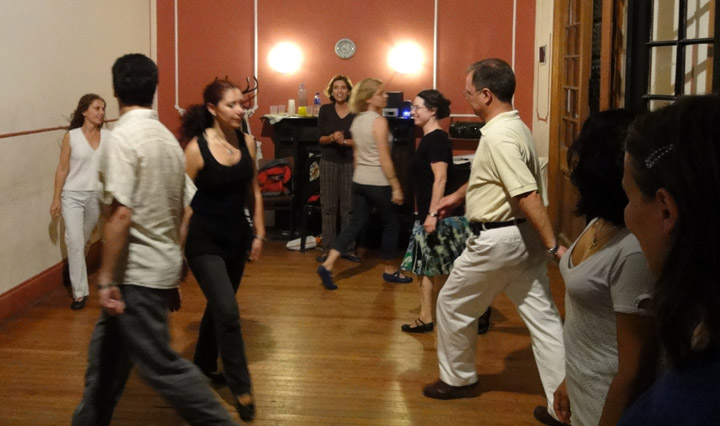 |
The Buenos Aires taxi driver delivered me to Montevideo 236, where I pushed the button and told the speaker that I was there for Scottish Dancing. After being buzzed in and finding my way upstairs, I noticed a number of rooms where different kinds of dancing were being done. I was pointed toward the front room, where I found class already in session. Sol (who turns out to be a woman, and the teacher, neither of which I had realized from our email correspondence) invited me in, explaining that the beginner class starts first, then the intermediates arrive and join in, then the evening finishes with intermediate class. I was added to the set after introductions and cheek kisses from all, the manner in which everyone greeted each other as they came and went from class.
Sol gave instructions in Spanish to her class, then translated for me, although it was fairly easy to tell what was going on - the beauty of demonstration. (A week after I came home, I was tickled to find on the Portland Ball program two of the dances that we danced in Buenos Aires: "The Barmkin" and "The Montgomeries' Rant.") As in any SCD class, there were various levels of proficiency, many helping h ands, and lots of laughter.
At the end of the evening, a fellow student, Marcela, kindly drove me back to my hostel. On the way there she told me a little of the history of the BASCDancers. The part that surprised me the most was that Sol had been taught SCD in grade school growing up in Buenos Aires. When I got home I emailed Sol for more information for our newsletter. Here is some of what she shared about her own path in SCD:
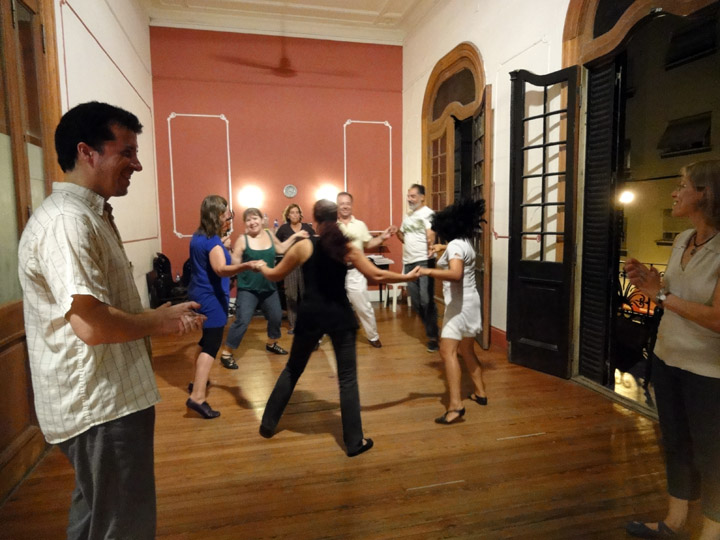 |
"What Marcela told you is right. I started dancing as a child. I went to a kind of primary bilingual school where we used to have "Scottish Dancing" once a week. After 20 years, in 1993 on a visit to Scotland, I came across a group of people doing a SCD performance at the Gardens below the Edinburgh Castle. I joined the dance after the demonstration and it was like riding a bicycle. Since then I did not stop dancing and started to go to the Summer School in St Andrews. The funny thing is that the school I used to go to does not exist anymore. It was sold in the 80's and the new owners gave it another name. The only activity that was preserved from the old school is "Scottish Dancing" for children and I am the teacher! It would be nice if one day we can visit you. I saw the web page of your group. You have a lot of activities! Congratulations!"
To wet your appetites for the next installment, a little more information from this group's web site: http://www.bascdancers.com.ar/es1024768/index.html
Branch members met at Linda Mae Dennis' and Patrick Hogan's home on May 18, 2019 for the Annual General Meeting, followed by delightful socializing and a tour of the garden.
We can access the draft minutes of the Royal Scottish Country Dance Society, Southwest Washington State Branch 2018-2019 Annual General Meeting here: http://www.rscds-swws.org/meetings/2019-05-18/02-AGM-05-18-19.doc
The 2019-2020 slate of elected officers is:
Chair - John Shaw
Vice Chair - Cynthia Soohoo
Secretary - Tom Halpenny
Treasurer - Paula Zellers
The Panel of Instructors has appointed Liza Halpenny to serve in the Teachers' Representative role for 2019-2020.
Many thanks to Susan Shaw for serving on the Board for the past six years in the Treasurer role and welcome to Paula Zellers as the new Treasurer.
We can view the Management Board history at http://www.rscds-swws.org/doc/BranchManagementBoardHistory.pdf
Reminder that interested persons can access the online "RSCDS-SWWS Branch Meetings and Correspondence Secretary Notebook" at http://www.rscds-swws.org/meetings.htm
The webpage will ask for a user name and password.
The user name is: cranberry
The password is: tart
All Management Board and General meeting minutes and reports are open for members to access. We can also access Branch business correspondence that occurs between meetings. We click a link to access a document. If you are interested, I can include you in the Branch secretary's email list for notifications. Please feel free to contact me with any feedback or questions at .
Calendar of Events | |||||||
|
|